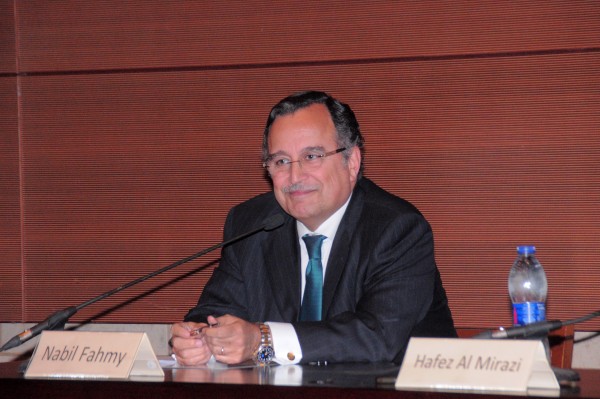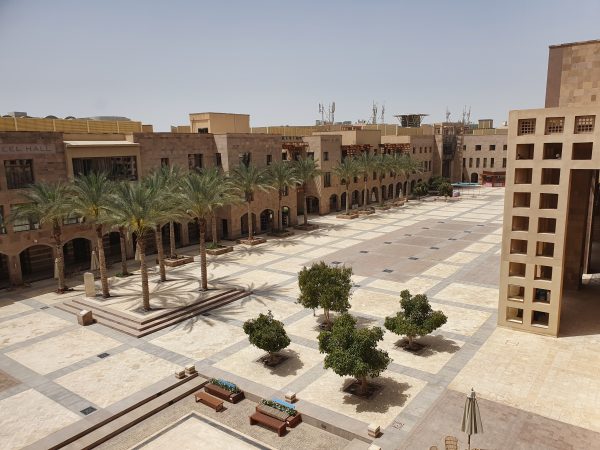The Fight to Save the Mother-Tongue: Arabic at AUC
By: Talia Riad
Photographer: Vereena Bishoy
Many AUC students struggle to express themselves in Arabic, preferring English as their first mode of communication, and say they feel pressured to excel in their native language.
Often this is an unfair situation to be in as private education in Egypt prizes English, French or German in the classroom, but Arabic is the official language of day-to-day business in the country.
Living in a first-class bubble, English became the standard of evaluation as Arabic waned as a benchmark of proficiency. But is American pop culture, widely available and downloadable, to blame?
“I have been teaching at AUC for many years, and it has been fascinating to watch how AUC students have more of an American accent and use far more American idioms and cultural references in their speech. I attribute this to a sharp increase in the consumption of American media,” said Yasmine Motawy, a Rhetoric and Composition professor.
When she first began teaching 16 years ago and called on students who were proficient in Arabic, all hands would go up. Today, there’s far fewer hands, and many who say they can read share that they never actually have. Having an AUC student competent in reading and writing Fusha (pronounced fus-ha) Arabic is almost unexpected and worth of celebration, she explains.
Fusha, also referred to as Modern Standard Arabic, Modern Written Arabic, or Classical Arabic, is the standardized form of literary Arabic used in religious texts, writing, and formal speeches.
Motawy traces the history of how Arabic children literature developed in her book Stillness between the waves – Egyptian Children’s Picturebooks and Contemporary Egyptian, published in 2021. She suggests that for several decades the quality and content of these Arabic-language books were unable to capture children’s attention or imagination.
“You may be privileged, but you are still a community in need, because there are very few children’s books out there that tell your stories and speak to your experiences,” Motawy explained.
She writes that Arabic children’s literature has experienced a “new wave” in the past 20 years, with far more quality books being produced and lucrative prizes being dedicated to Arab children’s literature.
Although reading has generally been in decline over the past 40 years, most Egyptian readers focus on English language writing. English literature, however, is not based on Arab culture therefore, it is an unrealistic educational tool or portrayal of local behavior and culture for young Egyptians.
“Arabic is necessary if AUC students are to continue to be leaders within the Arab world and if they will be leading producers of knowledge and creative works in Arabic,” said Motawy.
Multiple students in her classes blame the education system for their lack of proficiency in the Arabic language..
However, Motawy cautions that this is a very complex issue and says one should avoid simplistic scapegoating.
Manuel Schwab, a professor of Anthropology, believes the decline in local language to be a phenomenon that is not unique to the AUC community.
“English is generally spoken in more and more professional contexts, and it’s not just in Egypt. English is the Lingua Franca (the common/trade/bridge language). It is a language of power and that seeps into public life. Berlin is the same. Every place is the same,” said Schwab.
He elaborates that Arabic, particularly Fusha, remains a primary language for those interested in any field that requires negotiation, such as diplomacy, business, or politics in Arab countries.
Usually, all Arabs learn Fusha in school, yet rarely use it in their daily lives. But why does this happen?
According to Andrew Fahim, a political science senior, English is the language he turns to when speaking on a serious topic or in a formal setting, while the “colloquial” Egyptian dialect, not Standard Arabic, is the language he adopts informally with his friends. He only uses Fusha when absolutely necessary.
“Fusha will be essential when I actually start working with people of all backgrounds and social classes,” Fahim, who intends to work in diplomacy, said.
Rawya Lamei, another senior studying political science, says that throughout history, most known stories for kids were written by the Ministry of Education.
This started with Abdel Nasser’s policies to integrate republican values into the education system. Young Arabs were only exposed to the repeated stories of a perfect idyllic unrealistic protagonist who learns the same lessons on right and wrong.
“The lack of interest in Arabic literature is due to a lack of exposure more so than lack of content,” Lamei said.
She finds that while there is little depth or sophistication to the national curriculum, there are other resources to enjoy Arabic language such as the novels published by Kalimat, which are rich with character development and variety.
Kalimat is one of the biggest modern publishing houses for children and young adults in the Middle East. Based in the UAE, it was founded by Sheikha Bodour Al Qasimi, daughter of Sultan Al Qasimi.
Miral Motreb, a senior student studying Actuarial Science, reveals that due to the type of Arabic education she did receive, she no longer finds any interest in pursuing it further.
“It was all the same topics for expression: the importance of preserving the environment, the healthy mind comes from a healthy body, or a dissection of religious scripture[….]It’s as if they want to bore us out of the language,” Motreb said.
When she reads Naguib Mahfouz, she reads his translated work. She doesn’t find it necessary to adopt the Arabic language in order to enjoy literature. Or even to work, for that matter.
“I speak Arabic well enough to interact and communicate with people both in my personal and professional life but I don’t need to learn how to write or read Arabic,” Motreb said.




